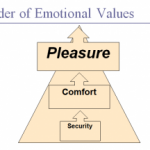 What emotions are people seeking to satisfy online? What can we understand about human motivations and values in order for content marketing to work?
What emotions are people seeking to satisfy online? What can we understand about human motivations and values in order for content marketing to work?
Maslow’s famous hierarchy of needs tells us we are motivated to satisfy our basic needs first (food, shelter, clothing), before we seek to obtain satisfaction for social, intellectual and spiritual needs.
A similar hierarchy of emotional values exists. As incoming information from web and blog pages enters the brain and is processed, our emotional centers assign values to offers.
Brain science, along with studies on decision making from behavioral economics, has shown that people often don’t use logical reasoning. Instead they go with their gut reactions. They make decisions based on feelings.
Later, when that leads to a buying decision, people justify their actions with rational logic and intellectual “alibis.”
At the lowest level, people have a desire for security. The next thing they seek is comfort. At the top of the ladder, people will pay the most to satisfy a desire to experience pleasure.
Although these values are all emotional, rationality plays a part. Online, an offer must work properly for consumers to feel secure. A marketing offer also provides comfort through ease of purchase, and also by providing reasons to defend the purchase to friends and family. But rationality is never the deciding factor. Read More→
Read More→











